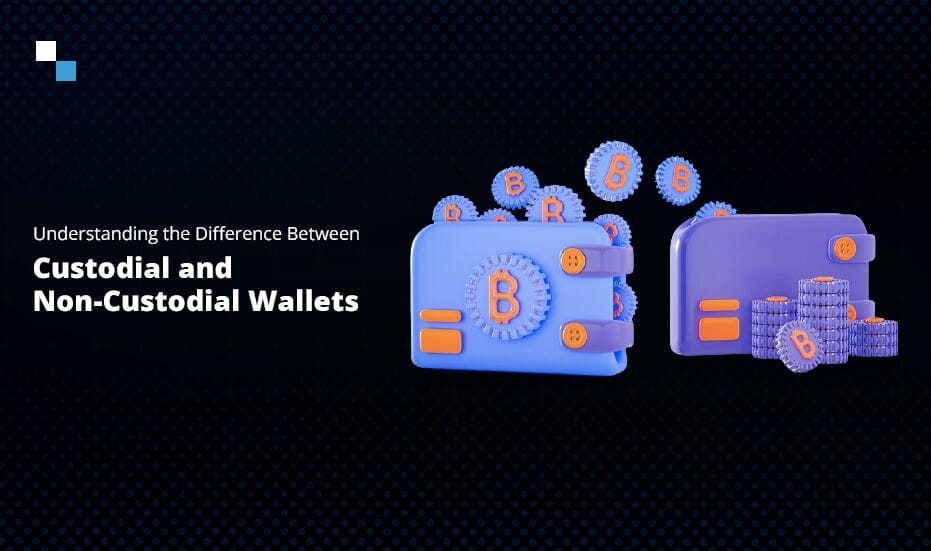
Ace-Up Your Crypto Business With Solana NFT Marketplace Development
January 17, 2022
Best Approaches to Develop Your Own Crypto Exchange Software in 2022
January 18, 2022Cryptocurrency wallets have emerged as the best business strategy. However, the entrepreneurs’ perplexity does not end with selecting the “correct” company model that flawlessly combines Blockchain and Cryptocurrencies.
While many people are discussing blockchain beyond cryptocurrencies, how to create cryptocurrency wallet, and which cryptocurrency will become the single global currency, many others are focusing on selecting the right wallet based on private key custody: Custodial vs Non-Custodial crypto wallet comparison. This is something we will go into in-depth in this post.
But, before we get into understanding the difference between Custodial vs. Non-Custodial, let’s first go through the fundamentals of both blockchain wallet kinds, commencing with Custodial Wallets.
What exactly is a Custodial Wallet?
A Custodial Wallet is one in which the private keys are maintained by a third party. That is, the third party has complete control over your cash, and all you have to do is provide authorization to make or receive payments.
What is a Non-Custodial Wallet?
It is a Blockchain wallet that allows you to be your own bank. This means that users have complete control over their cash as well as the related private key. Custodial vs. Non-Custodial Wallets: Understanding the Difference
- Custodian of private key
When comparing custodial and non-custodial wallets, the most important element to consider is the private key. In the case of Custodial wallets, the private key is managed by a third party. On the contrary, all blockchain custodian services belong to users in the case of Non-Custodial wallets. So, if you want to create a wallet where your users can act as their own bank, consider non-custodial cryptocurrency wallet development. .
- Transaction type
The transaction type is another thing to consider when comparing Custodial and Non-Custodial crypto wallets. In Non-Custodial, the transaction is reflected on the chain in real-time.
- Security
All confidential customer data is maintained in hot and cold storage in custodial online crypto wallets, which are frequently compromised by data attackers. As a result, unless the authoritative party applies strict security measures, the security level in custodial settings is low. In the case of a non-custodial crypto wallet, the entire information stays with the consumers. This reduces the possibility of data theft unless the user shares the details with someone or their device is stolen. So, once again, Non-Custodial wins the war of Custodial vs. Non-Custodial wallets.
Create your own Cryptocurrency Wallet
Schedule Free Demo- Backup and recovery possibility
Non-Custodial crypto wallets fall behind Custodial crypto wallets in terms of backup and recovery capabilities. Custodial wallets maintain the private key on their own. As a result, even if your users lose access to data, they can restore it by requesting it from a third party. However, in the case of Non-Custodial wallets, where your users are the sole authority, this is not feasible.
- Offline accessibility
To gain access to users’ funds and data, users must first log into their Custodial wallet and submit a request to a centralized authority. This necessitates the use of internet connectivity. Non-Custodial wallets, on the other hand, do not have this condition. As a result, Non-Custodial wallets are a superior solution for enjoying complete blockchain development services in real-time.
- Future scope
According to cryptocurrency industry trends, non-custodial wallets will continue to have an advantage over custodial wallets due to the increasing number of data breach incidents and consumers being more concerned about their data privacy and security.
- Examples
Free Wallet, Binance, BitMex, Bitgo, and Blockchain.com are some notable examples of top Custodial wallets. Among the finest non-custodial wallets for 2021 are Electrum, Exodus, Ledger Nano X, Trezor One, Zengo, and Wasabi.
While the above mentioned ‘Custodial vs. Non-Custodial wallets’ comparison considerations can assist you in selecting the best Blockchain wallet, we strongly suggest Non-Custodial Wallets. For, these non-custodial wallets list provides several chances and a brighter future in the marketplace – something that, in turn, establishes itself as a successful business move.
In A Nutshell
The major distinction between a custodial wallet and a non-custodial wallet is that the private key in a custodial wallet is handled by a third party, but in a non-custodial wallet, users are fully accountable for and in control of their assets.
If you are planning for cryptocurrency wallet development, partner with Antier Solutions. We specialize in the development of custodial and non-custodial wallets while focusing on security and user-friendliness. Our seasoned blockchain engineers and subject matter experts build custom wallets from the ground up, and at the same time, we are known for our white label wallet solution fortified with institutional-grade security and features to deliver world-class performance.
Schedule a free demo of our white label wallet solution or connect with our subject matter experts to get advice on how to create cryptocurrency wallet.



